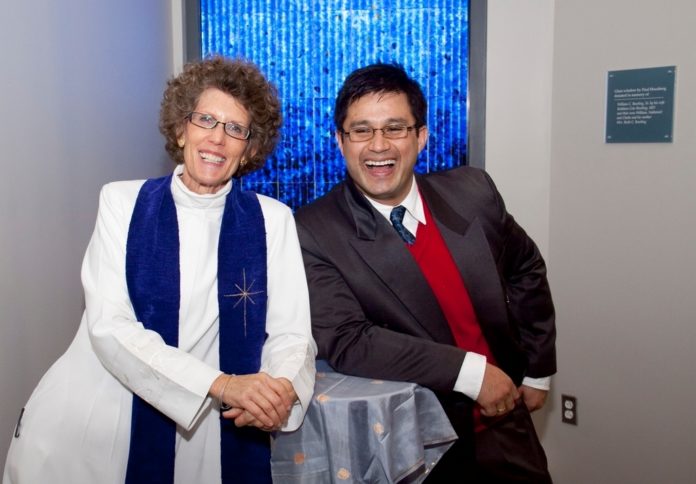
Women & Infants Hospital can be a very joyful place, with thousands of births each year and all the celebration that goes with them. But for many others, it’s a place of sadness and anguish – when a baby is premature, frail and sick, when a delivery goes badly, when a woman has cancer.
As chaplains, the Rev. Caroline Patterson, ordained as a Congregational minister, and the Rev. Wilson Villamar, trained as a Jesuit priest, go through the hospital every day and offer support to patients and their families, praying with them if desired, bringing other clergy as needed.
And last week, Women & Infants dedicated a new chapel, donated by the Macari Family Foundation and Summer Infant Inc., with an interfaith service that included prayers and blessings by Buddhist, Christian, Muslim, Jewish, Hindu and Native American leaders.
Patterson answered questions about the chapel and the chaplains’ work in the hospital.
PBN: How long have you been at Women & Infants, and what’s your background?
PATTERSON: I’ve been here 10 years, eight years full-time. I’ve been [a minister] for about 16 years; I was a special-ed teacher first. I went to divinity school at Harvard for six years … and when you train to be a hospital chaplain, there’s a specific kind of graduate education called clinical pastoral education, and a large part of the training is to teach you how to sort of check your own religion at the door, because we train to become multifaith chaplains.
So I don’t identify myself as any particular religion coming to a patient’s door; I was with a Buddhist woman today; they can be Muslim, Hindu, Wiccan … whatever they are, we’re pretty much trained to adapt. And if they need clergy from their own community, a rabbi or a Jehova’s Witnesses member, it’s our responsibility to get one.
PBN: How much contact do you have with patients and their families?
PATTERSON: Between Wilson and me, we probably do about 20, 30 visits a day. It depends. Sometimes we’ll go up to the fifth and sixth floors, where the well moms and babies are, and that’s just a [social] call. You knock on the door and you say, “Hello, I’m Caroline, I’m a chaplain here, and I wanted to let you know we’re around to offer support.” So that’s just an in-and-out visit, whereas this morning I visited for about 45 minutes with a woman who has cancer, and spoke with her husband. Yesterday, it was a family whose baby died. So we’re in constant patient contact, actually. … [Women & Infants also has] in-house hospice … and a [terminally ill, end-stage] patient can come and stay here until she dies. We build some pretty deep and lasting relationships that way; … it gives us a lot of time to sit and visit and come and go every day, and to get to know them, and we do sometimes end up doing patients’ funerals as well.
PBN: Talk about the new chapel; I’m surprised you didn’t have one before.
PATTERSON: Evidently, when Women & Infants moved here [in 1989] from the old Lying-In, they briefly had a chapel, but quickly space came to be at a premium, so they needed the space. So we did have something called a meditation room, where people could sit quietly, but we’ve had to send people to Hasbro or Rhode Island Hospital for years. So we’re really excited to have the new chapel. …
To have a hospital chapel for people to go to 24/7, and they can go there and rant and rave at God if they want, if they’re feeling totally overwhelmed, or even if they’re enormously happy, it’s important to have a space that just welcomes them with open arms. I feel so blessed.
My new office is right across from the chapel, and I see people going back and forth, and I think because patients can’t come out of their rooms as easily, the majority of use is hospital staff and the families. It’s wonderful to see people there in the mornings or during their lunch break. I had a young woman there this morning who had delivered a baby, so she could walk around, and she wanted me to say prayers with her for her baby. We’ve also used the chapel for baptisms, we had a Hindu service there when we first opened, a … blessing of a new mom.
PBN: How does the chapel serve people of so many faiths?
PATTERSON: We have purposely kept it a very multifaith space.
It doesn’t have any particular religious symbols in it, so that anybody of any faith, or no faith, could go in and feel comfortable.
We have crosses [available], we have menorahs, we’re getting some Muslim prayer rugs … and when the imam came here for the blessing, he showed us the direction to Mecca from here, so if a Muslim man comes in to pray, we’ll have a compass and we can show them which way they should face. … We also have a collection of all sorts of spiritual literature, everything from a Torah, to the Bible, to the Koran, Baha’i faith – we try to have a little bit for everybody when they need it: Seventh-Day Adventists, Mormons, you name it.
PBN: What role do you see yourselves playing in the healing experience? PATTERSON: We call ourselves more spiritual supporters. We get a patient list every day, and we just literally go up and down the halls and knock on doors. Sometimes we’re called in for specific reasons, but I might not know what this person on the other side believes. Even if she’s Catholic – there’s a lot of different ways of believing, even if you’re Catholic. So our job is to be, hopefully, a listening presence. We do a lot of listening. Somebody might be really angry at God – maybe their baby died, or they have cancer – or somebody is really rejoicing because their baby is OK and just got out of the NICU. We offer baptisms, blessings, prayers, but a lot of it is showing up. There’s a term for it in our field, and it’s called a ministry of presence.
Sometimes I’ll walk in a room and I’ll introduce myself as the chaplain, and I watch the blinds come down. There’s just this glazed look on their face – which is fine! Because a chaplain means a lot of different things to a lot of different people. Other times it’s like, “Where have you been? I’ve been here three days and you haven’t come to visit me.” So you never know how people are going to react.












